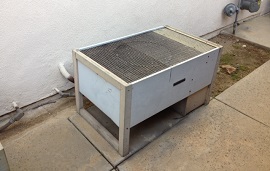An air conditioning system is a great way to improve the comfort levels in your home during the hottest months of the year. Many of us take our systems for granted until they fail and a repair is urgently needed. One of the most important parts of the system is the capacitor, and without it, the system cannot work or will short cycle. Let’s take a closer look at the capacitor to understand how it works and how you can identify a capacitor breakdown.
What is a Capacitor?
There are actually two different types of capacitors that are commonly found in heating and cooling systems. They are known as run or start capacitors; they are both used to temporarily store electrical charges and are used in different ways. A run capacitor is usually found in air conditioning systems, heat pumps, and furnaces. It is used to run the compressor and the fan motor, but it also has other important functions. When the system starts up, the run capacitor increases the torque and then helps to maintain a consistent level of voltage for the system to operate effectively. A start capacitor is only found in air conditioners, and heat pumps to provide sufficient power for starting up. Essentially, a capacitor helps to start the motor system, and it keeps the motors running while the system is operating. If the capacitor fails, the system will not short cycle or work.
How Does a Capacitor Fail?
A capacitor failure is one of the most common reasons for an air conditioning system breakdown. When an air conditioner is working hard during the hotter months of the year, the temperature is much higher. This coupled with the heat generated by the capacitor, can cause the capacitor to overheat and fail. The capacitor could simply suffer a degradation in its operating range or more likely; it could fail entirely. The net results, in either case, are the same; a total loss of air conditioning. The external unit of your system may still be making its distinctive humming sound, but the fans are not turning, and there is no treated air coming out of the vents.
How Can You Avoid a Capacitor Failure?
A capacitor can overheat and fail at almost any time if the temperature levels are too high. A regular maintenance schedule can certainly help to identify parts that are wearing out and need replacing. This will also help to improve the energy efficiency of the air conditioning system and consequently lower your energy bills. That being said, despite this a capacitor could still fail, and the air conditioning system will not work until this part is repaired. Since a capacitor stores an electrical charge, this repair or replacement should only be carried out by a qualified technician. There is a high risk of receiving a nasty electrical shock for the unwary, and you could cause more damage. A damaged capacitor can be easily fixed or replaced by an experienced professional with suitable equipment.
